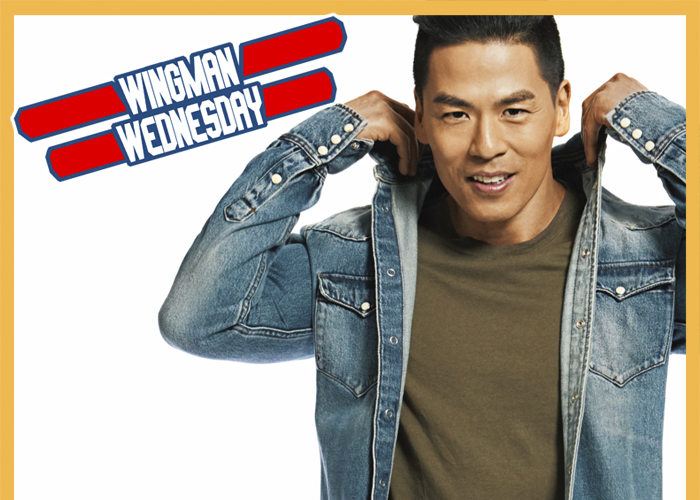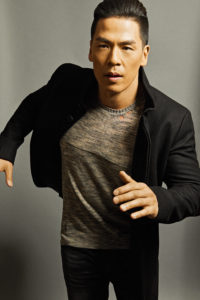
Rick Ting is simultaneously living two dreams.
As an actor, the Los Angeles native is firing off a career catapult, working in projects that are both creatively-fulfilling and watercooler-worthy, such as “Waco,” which premieres tonight on Paramount Network.
As a person, he is furthering lifelong interests. Training in martial arts even before he entered school, Ting has idolized Bruce Lee since he was just a boy and now finds himself starring in “Warrior,” an unfulfilled project of the iconic martial arts legend that is set to debut on Cinemax later this year.
We recently sat down with Ting to discuss his “Waco” journey, how he approaches playing non-fictional characters, and why landing a role in “Warrior” has impacted him so profoundly.
TrunkSpace: You’re set to star in “Waco” for Paramount Network, which premieres tonight. When you’re working on a project that is not only based on actual events but is also telling the story of actual people, does it put you in a position to approach the material in a different way than you would a fictional piece?
Ting: Yes, definitely. As an actor, I want to embody and completely resemble the real character/individual as accurately and specifically as possible. Having the opportunity to speak with the individual, his/her family members and friends as well as visiting places or locations that are significant to that individual character’s past and/or present life (i.e. schools, neighborhoods, work places, churches, vacation spots, etc.) are all examples of the character developmental process that I focus on. I am not only grateful to be working as an actor in Hollywood but to have the opportunity to be cast as an actual real-life person is truly an experience that ultimately flatters and humbles me. As a result, my detailed prep work and character research as well as my overall commitment in representing these characters on film is my way of honoring them and what they have accomplished and contributed to the world.
TrunkSpace: The story that “Waco” is telling, although dramatized for television, was in and of itself a very dramatic series of events that captivated the nation in 1993. As someone who was involved in the project, what do you think viewers will take from the series that they won’t find through watching one of the many newsmagazine programs revisiting the events?
Ting: I would say that “Waco” differentiates itself from other newsmagazine programs due to the extreme accuracy and specificities detailing the actual events that occurred in 1993. “Waco” is extremely true, real, and overall, convincing. I will not forget when I ran into Taylor Kitsch (who plays David Koresh) at the gym in Santa Fe, New Mexico (where we were filming on location). He was so skinny and emaciated that I honestly believed it was the real David Koresh working out on the stationary bike. The accuracy and close resemblance of all the characters in the series as well as the actual Waco compound are truly outstanding.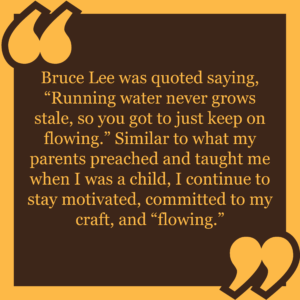
I remember watching the final scene where we completely burned the compound to ashes. To say the least, it was surreal, as it resembled the exact scene I remember watching on the news as a young teenager when the real Waco compound caught on fire and millions around the world watched it burn to the ground. I am excited for the fans to see our series as it accurately depicts the critical events prior to and during the entire 51-day siege of the Branch Davidians’ Waco compound.
TrunkSpace: From what we understand, “Waco” is telling the story through multiple points of view. Do you think that will help give the audience a different perspective on what transpired?
Ting: Definitely. I think it is very crucial in creating a complete picture of all the events that transpired as well as the various views and insights from everyone involved in the Waco situation ranging from the F.B.I., A.T.F., Branch Davidians, people of Waco, innocent bystanders, news reporters, etc. From what I have seen while filming, I believe that the audience will be exposed to a side of David Koresh, played by Taylor, that is unfamiliar and untold from the original media coverage.
TrunkSpace: In the series you play Lon, an FBI sniper. What is his journey through the course of “Waco?”
Ting: Lon Horiuchi is an F.B.I. Hostage Rescue Team (H.R.T.) sniper and former U.S. Army officer. He was the critical sniper that shot Vicki Weaver during the F.B.I. siege at Ruby Ridge in 1992. (In 1997, Horiuchi was charged with manslaughter for the death of Vicki Weaver at Ruby Ridge, but the charges were later dropped.) He was involved in controversial deployments during the 1992 Ruby Ridge standoff and 1993 Waco siege. As a result, the series opens with the events at Ruby Ridge and follows Horiuchi’s involvement all the way to the siege of the Waco compound in 1993.
TrunkSpace: 2018 seems to be gearing up to be an exciting year for you. Beyond “Waco,” you’re also set to star in the upcoming Cinemax drama series “Warrior,” which is inspired by the writings and work of Bruce Lee. In our research we read that this was a sort of dream project of Lee’s. Does it feel like you’re involved in something special, having an opportunity to be a part of a project that fulfills the unmet dreams of such an icon?
Ting: Of course! It was such an honor to be not only cast for this amazing project but to also be playing the real character of martial arts legend and close friend of Bruce Lee, Bolo Yeung. This project has impacted me in so many ways due to my childhood connection with Bruce Lee, as he was the sole reason for why I began studying martial arts at the age of four years old and continues to be one of my lifelong idols. Having the opportunity to work with his daughter, Shannon Lee, as well as director/executive producer, Justin Lin, executive producer, Danielle Woodrow, and writer, Jonathan Tropper – words cannot express how honored I am to bring to life an idea, vision, and dream of the legendary martial artist and my childhood idol, Bruce Lee. Ironically, throughout my life, I have often been referred to and called “Bolo” or “Chong Li” from my family, close friends, and numerous athletic teammates. Known for his notorious characters in “Enter the Dragon” and “Blood Sport,” Bolo Yeung has been someone I have also idolized due to his muscular physique and overall strong character acting. Being cast as Bolo in “Warrior” represents the biggest win of my career thus far as I am portraying the most iconic and hyper-masculine Asian character known throughout the world in a TV series written and created by the greatest martial artist of all time. I would never have imagined I would be given such an opportunity as a four year old child watching both Bruce Lee and Bolo Yeung in “Enter of the Dragon.”
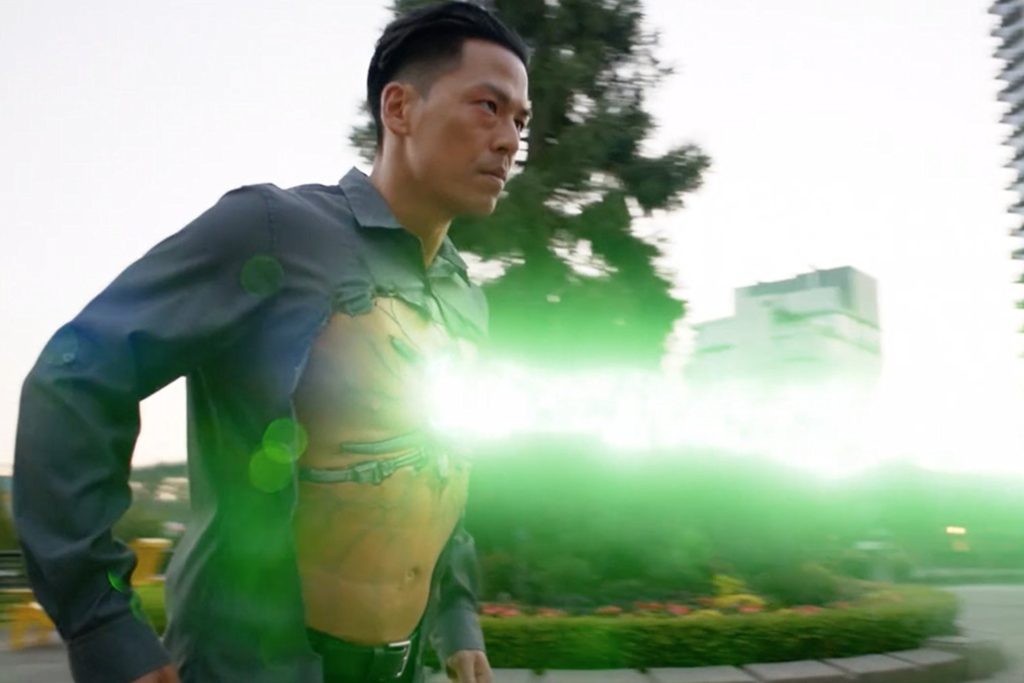
TrunkSpace: What’s really cool about “Warrior” is that it is wholly original, and yet, still has the cachet of a built-in audience because of Lee’s name attached to it. That’s a bit of a rarity in an industry that is increasingly becoming driven by sequels, prequels, and reminaginings. Do you get the sense that action fans will be all-in on the story knowing that it not only has roots that reach back to Lee, but that the creative team behind it is also so well-versed in the action space?
Ting: Most definitely! “Warrior” is not just another kung-fu action show with “everyone” knowing martial arts and having exceptional fighting skills. It focuses on the political, racial, economic, and cultural backdrop of San Francisco during the late 1800s. The creative team behind “Warrior” wanted it to be a real drama with a martial arts, action element. They wanted to keep it “real” and accurate of the time period as well as showcasing only a few characters that have exceptional fighting skills. The writer and producers have told me that they are determined to highlight specific fight scenes throughout the series in order to show the quality and high-level skill of martial arts fighting. Fans will definitely be captivated and drawn in whenever a select few characters, including myself, appear in a scene. They can anticipate danger, fear, conflict, and as a result, a “fight” will most likely be the outcome of such high-tension scenes.
TrunkSpace: You secured a dual J.D./M.B.A. before deciding to pursue acting. We have to ask… how did that conversation go with family and friends?
Ting: (Laughter) Well, my mom has always been a true supporter of my career dreams and goals. She has known about my childhood dream to pursue a career in acting and was 100 percent supportive when I broke the news to her that I wanted to move back to Los Angeles and pursue my acting in Hollywood. My dad, however, had always wanted me to go to medical school and have a career as a doctor, so the decision to turn down med school and continue my education in law and business already proved difficult at that time. It was definitely more difficult to update him later upon the completion of both law school and business school that I would turn down various offers from different law firms and pursue a career in acting. Over the years and throughout my projects, my dad has slowly accepted my chosen profession but I cannot thank my mom enough for all of her past and continued support, encouragement, and love that she has shown me throughout my journey in the entertainment industry. My close friends have all shown me tremendous support as well, always excited to see me on the television or big screen wherever they are in the world.
TrunkSpace: Was there ever a moment where you second guessed yourself and considered not taking that leap of faith with your creative interests?
Ting: Yes. In 2009, I had the opportunity to film a feature film in Vietnam that was funded and supported by the Vietnam government commemorating 1,000 years of Hanoi (the capital city of Vietnam). It was a period piece based on true characters that were all significant in the history of Vietnam. It was not only my first time in Vietnam but also my first time being outside of the U.S. Filming is a lot different in Southeast Asia than Hollywood and as result, I encountered a multitude of cultural, racial, economic, and social adversities while filming this feature film. There were constant delays and conflicts with shooting on various locations and long-story short, I ended up filming in Vietnam for almost 1 ½ years. (I also booked a Korean drama series that happened to be filming in Vietnam at the same time, which allowed me to film both shows simultaneously.) I was homesick, exhausted, and had multiple episodes of food poisoning and sickness. I remember one day in particular where we were on location in the dense jungles of North Vietnam (where Ho Chi Minh was said to have retreated and eventually died). I was sitting on a small plastic stool in the middle of the bamboo forest. It was 98 degrees Fahrenheit and over 100 percent humidity. The local village children had snuck their way into our set and had positioned themselves high in the trees among the bamboo stalks. If I had not inadvertently looked up towards the sky, I would have never seen the 50 or so children literally hanging out in the tops of the bamboo stalks all staring down at me as I rested. It was at this very moment, as sweat profusely ran down my face and chin, that I thought to myself, “What the hell am I doing in the jungles of North Vietnam?” There was no water, no restroom, no craft service station, no medical staff or personnel on set, no trailers, no catering, no English-speaking personnel, no security – nothing. It was just me in layers of traditional Chinese-inspired clothing sitting on a red plastic stool with local village children all staring at me from high above. I will never forget this moment in my journey as an actor as it always humbles me when I’m filming on a Hollywood set with all the simple amenities and luxuries, such as bottled water and porta potties.
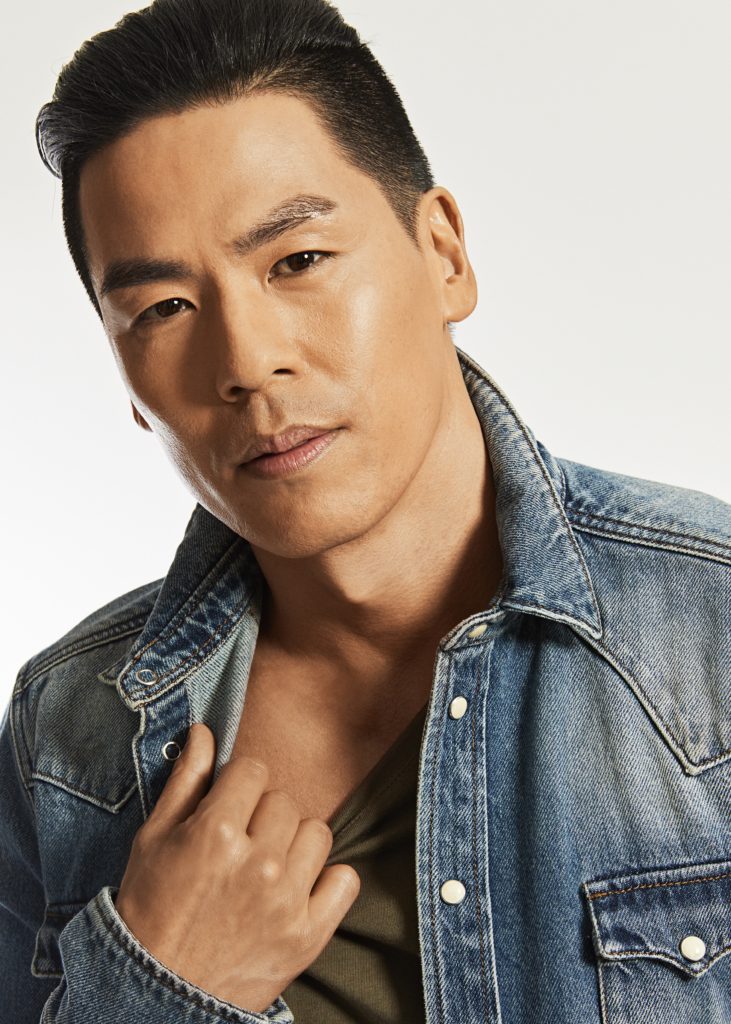
TrunkSpace: So often people take the “safe route” with their career decisions and ultimately end up regretting it later in life. “Had I known now what I know then” kind of stuff. That being said, knowing what you know now, can you imagine an alternative reality where you zigged instead of zagged and didn’t go for it with your acting? What does that look like? Would you feel fulfilled?
Ting: Honestly, I have always trusted my gut and instincts. Knowing absolutely nothing about the entertainment industry, I followed my gut instincts on what to do and who to trust. I have been extremely lucky throughout my journey as an actor staying very close to the road map I created for myself upon entering the business. I would say my only regret would be paying for the numerous head shots that every agent and manager would continue to find flaws with during the early stages of my career. I did not realize how difficult and expensive it would be to just obtain a classic theatrical headshot that everyone would agree on.
TrunkSpace: People change throughout the course of their lives. The core you is always the same, but interests and motivations find different nesting spots. Today, in 2018, what motivates you to continue to pursue acting and other creative endeavors?
Ting: Throughout my early life, I was always searching for something that would “wake me up in the morning and get me out of bed.” In college, I heard all of my classmates discuss their future plans and career goals but I still had not pinpointed exactly what I wanted to do. I always knew regardless of what I chose as a future career that I would need to absolutely love it, be it, and live it everyday of my life. From being a history major at Yale while completing all of my pre-med requirements to earning a joint J.D./M.B.A. dual degree in graduate school, I still did not know what I wanted to do with my life. My parents taught me to always keep working at something and never stop. If I didn’t know what to do, then I should just keep doing what I was currently working on. And that’s exactly what happened. An offer at a law firm in downtown Los Angeles brought me back to L.A. where I coincidentally received my first job offer to work on a Warner Bros.’ feature in the summer of 2007. My dream of being an actor in Hollywood had began and since, I continue to be motivated by the unknown factor of what will happen tomorrow, next week, next month, next year. When I was four years old, I began to study martial arts because of my motivation and inspiration from Bruce Lee. So many decades later, I am now continuing my childhood idol’s idea, dream, and vision he created prior to his unfortunate death. Never would I have thought that I would be starring in a project created by the greatest martial arts legend of all time while continuing the pursuit of my dream of being a Hollywood actor. Bruce Lee was quoted saying, “Running water never grows stale, so you got to just keep on flowing.” Similar to what my parents preached and taught me when I was a child, I continue to stay motivated, committed to my craft, and “flowing.”
TrunkSpace: You’re a 1st degree black belt in Tae Kwon Do, Jeet Kune Do, and Wing Chun. Are martial arts still a big part of your life and do they help you to stay grounded and focused on things outside of the entertainment industry?
Ting: Martial arts have always been a significant part in my life. It established the foundation of not only my biomechanics as an athlete but also the mental, emotional, and spiritual structures of having self-discipline, self-respect, self-control, and perseverance. I believe that with the culmination of both my martial arts training and the morals and lessons established by my parents at a young age, I have been able to stay focused and committed on being not only an obedient and respectful son but also a well-grounded individual.
TrunkSpace: Are there any parallels to studying martial arts and studying the craft of acting? Do they intersect anywhere, either in principal or training/focus techniques?
Ting: Most definitely. Martial arts emphasize and strive to teach self-discipline, self-control, integrity, focus, commitment, balance, and perseverance. All of these qualities apply to not only the craft of acting but to life in general. Throughout the various adversities we are confronted with and face in everyday life to our individual careers to our personal relationships, I am grateful and extremely thankful for my parents allowing me to begin my martial arts training at such a young age so that all of these values and foundational qualities could be installed and integrated into my early development as a young child. I believe that these same qualities co-exist and intersect with my training as an actor, and I continue to use all of the tools and techniques from my martial arts background to help me grow and mature as an actor.
“Waco” premieres tonight on Paramount Network.
“Warrior” premieres on Cinemax this fall.


